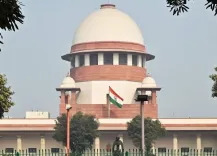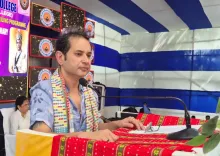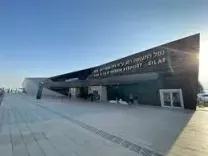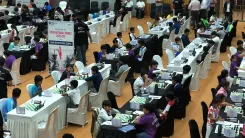DMK Activists Deface Hindi Letters on Railway Station Board in Sankarankoil
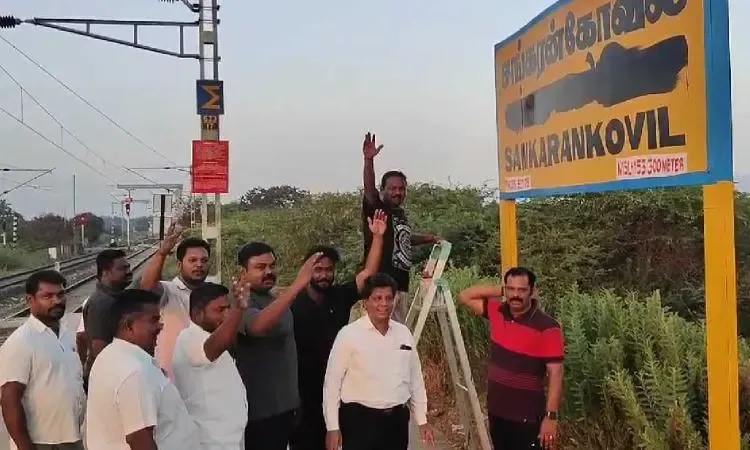
Synopsis
Key Takeaways
- DMK workers vandalize Hindi letters on railway boards.
- RPF initiates investigation into defacement incidents.
- Previous similar acts occurred at Pollachi and Palayamkottai.
- Protests stem from opposition to Hindi imposition.
- Financial disputes between Tamil Nadu and the Central government intensify.
Chennai, Feb 24 (NationPress) A collective of DMK activists, spearheaded by Sankarankovil MLA E. Raja, applied grease to the Hindi letters on the name board of Sankarankoil railway station in the Tenkasi district on Monday.
On the previous day, similar acts of vandalism occurred at Pollachi and Palayamkottai railway stations.
The Railway Protection Force (RPF) has initiated an inquiry into the incident.
On Sunday, five DMK members, directed by local leader K. Selvaraj, faced charges for blackening the Hindi letters on the Pollachi railway station name board.
Moreover, six party members were detained for altering the Hindi name board at Palayamkottai railway station, where they also chanted slogans against the imposition of Hindi.
Following the viral spread of videos depicting the incidents on social media, the RPF charged Selvaraj and his associates under various provisions of the Railway Act, including Section 147 (trespassing), Section 145B (causing nuisance), and Section 166 (defacing public notices).
As per police sources, the accused vandalized three name boards as a protest against what they view as attempts to enforce the Hindi language.
When railway police intervened, a confrontation erupted, with the DMK activists shouting slogans against the Central government’s three-language policy. Despite the unrest, railway officials swiftly restored the name boards within an hour.
The Palakkad Division of the Southern Railway later confirmed this on social media, stating, “The name boards were rectified immediately.”
Meanwhile, the RPF in Tirunelveli has filed cases against six individuals, including Rajavarman, the state deputy secretary of the DMK Engineering Wing, under Sections 147, 166, and 145B of the Railway Act.
The ongoing conflict between Tamil Nadu and the Central government over the implementation of the National Education Policy (NEP) has escalated in recent months.
The DMK administration has consistently accused the Union Ministry of Education of withholding essential funding for state-sponsored educational initiatives.
Tamil Nadu Deputy Chief Minister Udhayanidhi Stalin has reaffirmed the state’s commitment to the two-language policy (Tamil and English), rejecting the three-language framework proposed in the NEP.
Union Education Minister Dharmendra Pradhan had previously criticized Tamil Nadu Chief Minister M.K. Stalin for depicting progressive reforms as threats for political advantage.
Pradhan urged Stalin to set aside political conflicts and recognize the advantages of NEP for young learners. The debate also encompasses educational funding, with Chief Minister M.K. Stalin appealing to Prime Minister Narendra Modi to release Rs 2,152 crore in Samagra Shiksha Abhiyan (SSA) funds for Tamil Nadu.
In a letter to the Prime Minister, Stalin opposed linking SSA with the PM SHRI scheme, asserting that these are separate centrally sponsored programs. He argued that the Centre’s strategy undermines the principles of cooperative federalism and adversely affects students and teachers in Tamil Nadu.
Stalin further accused the Central government of leveraging financial allocations to coerce states into adopting centrally mandated policies.
He urged the Prime Minister to ensure the unconditional release of SSA funds, independent of NEP stipulations. The three-language debate continues to be a contentious issue in Tamil Nadu, with the state’s primary opposition party, AIADMK, also supporting the two-language policy.

